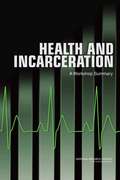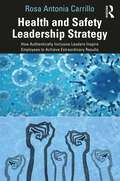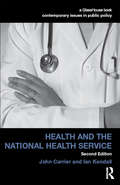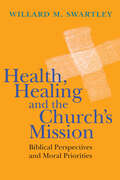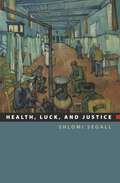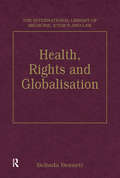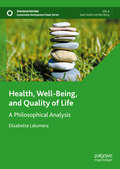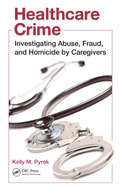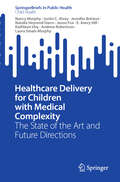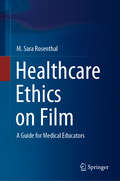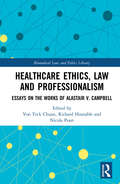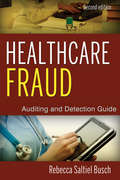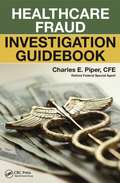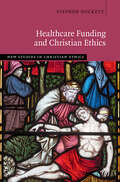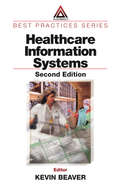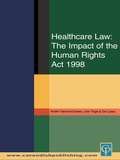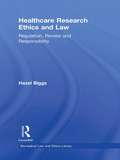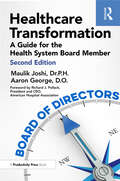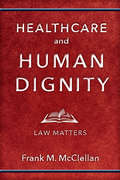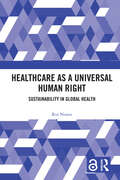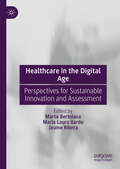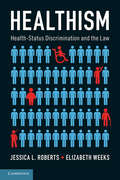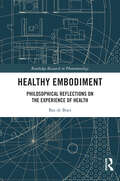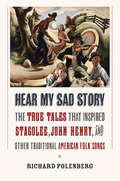- Table View
- List View
Health and Incarceration
by Institute of Medicine National Research Council Division of Behavioral and Social Sciences and Education Committee on Law and Justice Board on the Health of Select Populations Amy Smith Committee on Causes and Consequences of High Rates of IncarcerationOver the past four decades, the rate of incarceration in the United States has skyrocketed to unprecedented heights, both historically and in comparison to that of other developed nations. At far higher rates than the general population, those in or entering U.S. jails and prisons are prone to many health problems. This is a problem not just for them, but also for the communities from which they come and to which, in nearly all cases, they will return. Health and Incarceration is the summary of a workshop jointly sponsored by the National Academy of Sciences(NAS) Committee on Law and Justice and the Institute of Medicine(IOM) Board on Health and Select Populations in December 2012. Academics, practitioners, state officials, and nongovernmental organization representatives from the fields of healthcare, prisoner advocacy, and corrections reviewed what is known about these health issues and what appear to be the best opportunities to improve healthcare for those who are now or will be incarcerated. The workshop was designed as a roundtable with brief presentations from 16 experts and time for group discussion. Health and Incarceration reviews what is known about the health of incarcerated individuals, the healthcare they receive, and effects of incarceration on public health. This report identifies opportunities to improve healthcare for these populations and provides a platform for visions of how the world of incarceration health can be a better place.
Health and Safety Leadership Strategy: How Authentically Inclusive Leaders Inspire Employees to Achieve Extraordinary Results
by Rosa Antonia CarrilloThe purpose of this book is to awaken leaders to the unique opportunities now present in the areas typically delegated to Health and Safety. It is a strategy to utilize existing resources to fully develop and engage human potential to catapult business achievement. The confluence of Covid-19, the resulting burnout, the attention on diversity, equity and inclusion generated by the Black Lives Matter movement and the ‘great resignation’ continues to create openings to fundamentally change how we address personal development, sustainable growth and social responsibility. The argument within is that the better we manage the social aspects of the organization, the better our business results. Elucidating to the reader the societal shifts of workplace culture in recent years, this text expertly analyzes the importance of mental health in the workplace, whilst also explaining how management and HR departments can improve. It examines who is responsible for generating psychological safety and provides relationship strategies that will improve performance. The critiques in this text establish why it is imperative for business leaders to concentrate on how their company culture affects their employees, and whether their employees feel safe, seen and supported. The concepts and practices in this book are the ones that leaders have used across the ages to create commitment, accountability and excellence. Managers will benefit from a deeper understanding of how these issues impact every aspect of organizational performance. This book is essential reading for executives, leaders and those interested in leadership. They could be in the C-suite, operations, health and safety and HR. It is also directly relevant to organization development and change management specialists interested in including safety within their practice.
Health and the National Health Service (Contemporary Issues in Public Policy)
by John Carrier Ian KendallThe NHS came into existence in an atmosphere of conflict centred on the strong ideological commitment of the Post-war Labour Government and the opposition of the Conservative Party of that time to the idea of a universally available and centrally planned medical care service. There was also opposition from some sections of the medical establishment who feared the loss of professional autonomy. Setting health policy in both an historical and modern context (post 1997) Carrier and Kendall weigh up the successes and failures of the National Health Service and examine the conflicts which have continued for over sixty years, in spite of efforts to solve financial problems in the NHS through increases in funding as well as structural and organisational change. After looking at recent responses to supposed failures of the NHS, they conclude that the NHS has successfully faced the challenges before it and is likely to continue to meet the changing health needs of the population. Financial stresses, concerns about the quality of care and demographic change, with consequent issues for the elderly and the chronically ill, continue to be urgent and politically contentious issues. This book is appropriate for a wide range of undergraduate and postgraduate students studying health policy and the NHS.
Health, Healing and the Church's Mission: Biblical Perspectives and Moral Priorities
by Willard M. SwartleyDoes the Christian community have the resources to develop a coherent response to health care challenges today? Accounting for biblical, theological and church-historical streams, Willard Swartley divulges a long tradition of healing and health care inherited by Christians today. Beginning with in-depth studies of Old and New Testament understandings of healing, the book surveys three millennia of biblical and theological teaching and practice in congregational life and mission. Along the way Swartley uncovers how Christians have understood the role of the church and other institutions in providing health and healing. The book concludes with an attempt to synthesize these biblical, historical and moral perspectives to help all Christians, including those in health care professions, respond to our current health care challenges.
Health, Luck, and Justice
by Shlomi Segall"Luck egalitarianism"--the idea that justice requires correcting disadvantages resulting from brute luck--has gained ground in recent years and is now the main rival to John Rawls's theory of distributive justice. Health, Luck, and Justice is the first attempt to systematically apply luck egalitarianism to the just distribution of health and health care. Challenging Rawlsian approaches to health policy, Shlomi Segall develops an account of just health that is sensitive to considerations of luck and personal responsibility, arguing that people's health and the health care they receive are just only when society works to neutralize the effects of bad luck. Combining philosophical analysis with a discussion of real-life public health issues, Health, Luck, and Justice addresses key questions: What is owed to patients who are in some way responsible for their own medical conditions? Could inequalities in health and life expectancy be just even when they are solely determined by the "natural lottery" of genes and other such factors? And is it just to allow political borders to affect the quality of health care and the distribution of health? Is it right, on the one hand, to break up national health care systems in multicultural societies? And, on the other hand, should our obligation to curb disparities in health extend beyond the nation-state? By focusing on the ways health is affected by the moral arbitrariness of luck, Health, Luck, and Justice provides an important new perspective on the ethics of national and international health policy.
Health, Rights and Globalisation (The International Library of Medicine, Ethics and Law)
by Belinda BennettThis volume draws together essays from leading scholars on the challenges that arise for health, law, policy and ethics at the intersections of health, rights and globalization. The papers in this volume address global issues in public health, globalization and bioethics, and globalization and biotechnology. This volume will be invaluable to all those interested in global issues in health.
Health, Well-Being, and Quality of Life: A Philosophical Analysis (Sustainable Development Goals Series)
by Elisabetta LalumeraThis book analyses and discusses from a philosophical perspective the concepts of health, well-being and quality of life in contemporary biomedical research. The guiding idea of the book is that different concepts of health, well-being, and quality of life lead to different types of projects, actions and policies, both at the individual and institutional level. For this reason, it is important to analyse them and make them clear, in their interweaving of objective dimensions (the facts) and evaluative dimensions (the values).
Healthcare Crime: Investigating Abuse, Fraud, and Homicide by Caregivers
by Kelly M. PyrekCrime perpetrated by healthcare professionals is increasingly pervasive in today‘s hospitals and other healthcare settings. Patients, coworkers, and employers are vulnerable to exploitation, fraud, abuse, and even murder. Investigative journalist Kelly M. Pyrek interviews experts who provide accounts concerning the range of criminality lurking in t
Healthcare Decision-Making and the Law
by Mary DonnellyThis analysis of the law's approach to healthcare decision-making critiques its liberal foundations in respect of three categories of people: adults with capacity, adults without capacity and adults who are subject to mental health legislation. Focussing primarily on the law in England and Wales, the analysis also draws on the law in the United States, legal positions in Australia, Canada, Ireland, New Zealand and Scotland and on the human rights protections provided by the ECHR and the Convention on the Rights of Persons with Disabilities. Having identified the limitations of a legal view of autonomy as primarily a principle of non-interference, Mary Donnelly questions the effectiveness of capacity as a gatekeeper for the right of autonomy and advocates both an increased role for human rights in developing the conceptual basis for the law and the grounding of future legal developments in a close empirical interrogation of the law in practice.
Healthcare Delivery for Children with Medical Complexity: The State of the Art and Future Directions (SpringerBriefs in Public Health)
by Andrew Robertson Jason Fox Nancy Murphy Justin C. Alvey Jennifer Brinton Natalie Heyrend Darro E. Avery Hill Kathleen Irby Laura Smals-MurphyThis book describes the state of the art of pediatric complex care, sharing the authors' decades of experience in an academic health center to illustrate points. The authors are pediatric generalist and subspecialist providers, among others, who care for children with medical complexity in a Pediatric Complex Care program. Children with medical complexity (CMC) are a small yet impactful pediatric population, a subset of children with special healthcare needs that include multi-system, non-categorical, chronic conditions, high resource and technology dependencies, medical fragility, and functional impairments. CMC do not fit into traditional systems of care. They require the continuous collaboration of pediatric subspecialists, community and public health partners, and family caregivers. The field of Pediatric Complex Care is rapidly evolving, yet lacks a well-prepared workforce built on clear educational competencies and clinical guidelines. In this compact volume, the authors review models of care for CMC, and how these models intersect with larger public health systems, dependent on collaborative networks of community-based and family partnerships. They explore ethical considerations, including implications for policy and practice. Among the topics covered are: The Specialty and Scope of Complex Care Pediatrics Ethical Considerations in the Care of Children with Medical Complexity Implications for Policy and Practice Healthcare Delivery for Children with Medical Complexity: The State of the Art and Future Directions is an essential resource for all medical professionals who care for CMC, public policy makers, medical educators, healthcare leaders, and community partners and stakeholders.
Healthcare Ethics on Film: A Guide for Medical Educators
by M. Sara RosenthalThis book is a companion to Clinical Ethics on Film and deals specifically with the myriad of healthcare ethics dilemmas. While Clinical Ethics on Film focuses on bedside ethics dilemmas that affect the healthcare provider-patient relationship, Healthcare Ethics on Film provides a wider lens on ethics dilemmas that interfere with healthcare delivery, such as healthcare access, discrimination, organizational ethics, or resource allocation. The book features detailed and comprehensive chapters on the Tuskegee Study, AIDS, medical assistance in dying, the U.S. healthcare system, reproductive justice, transplant ethics, pandemic ethics and more. Healthcare Ethics on Film is the perfect tool for remote or live teaching. It’s designed for medical educators and healthcare professionals teaching any aspect of bioethics, healthcare ethics or the health sciences, including medical humanities, history of medicine and health law. It is also useful to the crossover market of film buffs and other readers involved in healthcare or bioethics.
Healthcare Ethics, Law and Professionalism: Essays on the Works of Alastair V. Campbell (Biomedical Law and Ethics Library)
by Richard Huxtable Voo Teck Chuan Nicola PeartHealthcare Ethics, Law and Professionalism: Essays on the Works of Alastair V. Campbell features 15 original essays on bioethics, and healthcare ethics specifically. The volume is in honour of Professor Alastair V. Campbell, who was the founding editor of the internationally renowned Journal of Medical Ethics, and the founding director of three internationally leading centres in bioethics, in Otago, New Zealand, Bristol, UK, and Singapore. Campbell was trained in theology and philosophy and throughout his career worked with colleagues from various disciplines, including law and various branches of healthcare. The diversity of topics and depth of contributors’ insights reflect the breadth and impact of Campbell’s philosophical work and policy contributions to healthcare ethics. Throughout his long academic career, Campbell’s emphasis on healthcare ethics being practice-oriented, yet driven by critical reflection, has shaped the field in vital ways. The chapters are authored by leading scholars in healthcare ethics and law. Directly engaging with Campbell’s work and influence, the essays discuss essential questions in healthcare ethics relating to its methodology and teaching, its intersection with law and policy, medical professionalism, religion, and its translation in different cultural settings. Chapters also grapple with specific enduring topics, such as the doctor-patient relationship, justice in health and biomedical research, and treatment of the human body and the dead.
Healthcare Fraud
by Rebecca S. BuschAn invaluable tool equipping healthcare professionals, auditors, and investigators to detect every kind of healthcare fraudAccording to private and public estimates, billions of dollars are lost per hour to healthcare waste, fraud, and abuse. A must-have reference for auditors, fraud investigators, and healthcare managers, Healthcare Fraud, Second Edition provides tips and techniques to help you spot--and prevent--the "red flags" of fraudulent activity within your organization. Eminently readable, it is your "go-to" resource, equipping you with the necessary skills to look for and deal with potential fraudulent situations.Includes new chapters on primary healthcare, secondary healthcare, information/data management and privacy, damages/risk management, and transparencyOffers comprehensive guidance on auditing and fraud detection for healthcare providers and company healthcare plansExamines the necessary background that internal auditors should have when auditing healthcare activitiesManaging the risks in healthcare fraud requires an understanding of how the healthcare system works and where the key risk areas are. With health records now all being converted to electronic form, the key risk areas and audit process are changing. Read Healthcare Fraud, Second Edition and get the valuable guidance you need to help combat this critical problem.
Healthcare Fraud Investigation Guidebook
by Charles E. PiperSome have estimated that healthcare fraud in the United States results in losses of approximately $80 billion a year. Although there are many books available that describe how to detect healthcare fraud, few address what must be done after the fraud is detected. Filling this need, Charles Piper‘s Healthcare Fraud Investigation Guidebook details not only how to detect healthcare fraud, but also how to investigate and prove the wrongdoing to increase the likelihood of successful prosecution in court.The book starts by covering the history of healthcare insurance and the various types of fraud schemes. It presents Charles Piper‘s unique approach to investigating (The Piper Method) which allows readers to conduct as many as 10 simultaneous investigations for each case. It emphasizes the importance of simultaneously searching for waste and abuse as well as systemic weaknesses and deficiencies that caused or contributed to the problem or wrongdoing under investigation and then make recommendations for improvement. It also provides:Questions to ask whistleblowers, complainants, employers, employees, and healthcare providers who are suspectsTips on investigative case planning, goals, and strategiesSample visual aids for use when briefing others about your investigative findingsGuidance on presenting information obtained from healthcare investigations and on how to testify in courtTechniques for uncovering previously undetected fraudThe book includes a sample case study that walks readers through a mock case from the time the case is received through the end. The case study demonstrates how to initiate, plan, and conduct a thorough and complete healthcare fraud investigation while incorporating Piper‘s proven methodology.Sharing insights gained through Charles Piper‘s decades o
Healthcare Funding and Christian Ethics (New Studies in Christian Ethics)
by Stephen DuckettHealthcare has an impact on everyone, and healthcare funding decisions shape how and what healthcare is provided. In this book, Stephen Duckett outlines a Christian, biblically grounded, ethical basis for how decisions about healthcare funding and priority-setting ought to be made. Taking a cue from the parable of the Good Samaritan (Luke 10:25-37), Duckett articulates three ethical principles drawn from the story: compassion as a motivator; inclusivity, or social justice as to benefits; and responsible stewardship of the resources required to achieve the goals of treatment and prevention. These are principles, he argues, that should underpin a Christian ethic of healthcare funding. Duckett's book is a must for healthcare professionals and theologians struggling with moral questions about rationing in healthcare. It is also relevant to economists interested in the strengths and weaknesses of the application of their discipline to health policy.
Healthcare Information Systems
by Kevin BeaverThe move to manage medicine from a financial perspective, i.e. managed care, has added huge layers of bureaucratic and administrative functions to healthcare. The need to have the ability to track patient medical records, mandated by government legislation such as HIPAA, is bringing new technologies and processes into the healthcare arena. A univer
Healthcare Law: Impact of the Human Rights Act 1998
by Tom Lewis John Tingle Austen Garwood-GowersWith many issues still to be resolved,the Human Rights Act has brought considerable uncertainty with respect to healthcare law. Written as a critical collection of essays, this invaluable book provides a careful examination and analysis of the issues and how they might be resolved. The book fully explores the relevance and potential impact of the European Convention on Human Rights and Biomedicine, both genetically and in specific areas such as medical research and biotechnology.
Healthcare Research Ethics and Law: Regulation, Review and Responsibility (Biomedical Law and Ethics Library)
by Hazel BiggsThe book explores and explains the relationship between law and ethics in the context of medically related research in order to provide a practical guide to understanding for members of research ethics committees (RECs), professionals involved with medical research and those with an academic interest in the subject. Healthcare Research Ethics and Law sets out the law as it relates to the functions of Research Ethics Committees (RECs) within the context of the process of ethical review and aims to be accessible and readily understood by REC members. Each chapter begins by locating the material within the practical context of ethical review and then provides a more theoretical and analytical discussion detailing how the theory and practice fit together. The key legal issues of confidentiality, consent and negligence are addressed in detail, alongside practical guidance as to how and when liability may be incurred in these areas. In addition, the practical and legal implications of the implementation of European Directive 2001/20/EC, the Human Tissue Act 2004 and the Mental Capacity Act 2005 are considered alongside a discussion of their socio-political background and relevance for medical research in the UK.
Healthcare Transformation: A Guide for the Health System Board Member
by Maulik Joshi, Dr.P.H. Aaron George, DOThe purpose of this book is to offer health system board members an actionable, concise guide on their role as well as provide updates on key changes in health care delivery, including evidence and contemporary examples.The goal is for any board member to have an opportunity to not only be literate in healthcare, but to be supportive and engaged in the transformation of their organization and the industry towards improving health. Hospital and Health system board members, regardless of their experience and expertise, are challenged with keeping pace with healthcare performance and strategy. Surveys continue to show that this is not their comfort level, given healthcare complexity and the rate of recent change and targets for transformation. The aim of this book is to keep the guide concise so that all board members can become fairly literate on the major issues, with an emphasis on recent updates in healthcare, for today and the future.This is an ideal book for new board members for their orientation to the Board and for all board members to use to have a knowledge base and a set of questions to facilitate their engagement on these important issues. Much has changed since the initial printing of Healthcare Transformation in 2009, and this 2nd edition provides updated resources and more contemporary examples and lessons for both new and seasoned board members. This edition updates all chapters and provides 3 new transformers/chapters to consider.
Healthcare and Human Dignity: Law Matters (Critical Issues in Health and Medicine)
by Frank M. McClellanThe individual and structural biases that affect the American healthcare system have serious emotional and physical consequences that all too often go unseen. These biases are often rooted in power, class, racial, gender or sexual orientation prejudices, and as a result, the injured parties usually lack the resources needed to protect themselves. In Healthcare and Human Dignity, individual worth, equality, and autonomy emerge as the dominant values at stake in encounters with doctors, nurses, hospitals, and drug companies. Although the public is aware of legal battles over autonomy and dignity in the context of death, the everyday patient’s need for dignity has received scant attention. Thus, in Healthcare, law professor Frank McClellan’s collection of cases and individual experiences bring these stories to life and establish beyond doubt that human dignity is of utmost priority in the everyday process of healthcare decision making.
Healthcare as a Universal Human Right: Sustainability in Global Health
by Rui NunesThis important book outlines how, despite varying levels of global socio-economic development, governments around the world can guarantee their citizens’ fundamental right to basic healthcare. Ground in the philosophical position that healthcare is an essential element to human dignity, the book moves beyond this theoretical principle to offer policy makers a basis for health policies based on public accountability and social responsiveness. Also emphasizing the importance of global co-operation, particularly in the area of health promotion and communication, it addresses, too, the issue of financial sustainability, suggesting robust mechanisms of economic and social regulation. New opportunities created by e-health, evidence-based data and artificial intelligence are all highlighted and discussed, as is the issue of patient rights. Students and researchers across bioethics, public health and medical sociology will find this book fascinating reading, as will policy makers in the field.
Healthcare in the Digital Age: Perspectives for Sustainable Innovation and Assessment
by Jaume Ribera Marta Bertolaso Maria Laura IlardoThis book offers a comprehensive exploration of the dynamic relationship between digital technology and healthcare delivery, emphasising sustainable innovation in health services. It explores how digital technologies improve healthcare outcomes, enhance patient and community experiences, and streamline healthcare management, while addressing ethical, philosophical, and policy challenges tied to healthcare digitization. Examining trends such as telemedicine, AI diagnostics, data security, and the Internet of Medical Things (IoMT), the book highlights global case studies, lessons learned, and strategies for integrating these technologies sustainably. It discusses the contextual, economic, and social impacts of digital health, presenting frameworks for their evaluation and improvement. Advocating for regulatory policies that prioritise privacy, accessibility and enhance responsible initiative, the book calls for collaborative approaches. Aimed at healthcare professionals, policymakers, and academics, this resource provides insights into creating a more efficient and equitable healthcare system, aligning with the broader goals of public health and social justice.
Healthism: Health-Status Discrimination and the Law
by Jessica L. Roberts Elizabeth WeeksCan an employer refuse to hire someone who tests positive for nicotine or alcohol? Can an airline or movie theatre require overweight customers to purchase two seats? Can a health insurance company refuse to sell policies to those most in need of medical care? Can the government condition public assistance on wellness program participation or work activity? In this illuminating book, Jessica L. Roberts and Elizabeth Weeks consider these and similar questions, offering readers a nuanced analysis of when and why discrimination based on health status - or 'healthism' - should be allowed, and when it should not. They provide a methodology to distinguish desirable health-based classifications from the undesirable, and propose law and policy solutions to encourage the former and limit the latter. This work should be read by anyone concerned with how government does - and does not - regulate based on health.
Healthy Embodiment: Philosophical Reflections on the Experience of Health (Routledge Research in Phenomenology)
by Bas de BoerThis book provides a philosophical analysis of the experience of health and investigates how this experience is shaped by recent developments in medicine and public health. It shows how phenomenological and Foucauldian approaches to health can be systematically integrated into a general account of healthy embodiment.Many medical practitioners argue for a shift from curative to preventative medicine. Technoscientific developments now enable us to track our health and provide more effective ways to live healthily. This book argues that these developments shape how we experience our health of and others, as well as the way in which we distinguish between health and illness. Its starting point is that health is not so much an object with well-defined boundaries that can be scrutinized scientifically but is better understood as an embodied experience. The author uses phenomenology and the work of Foucault to develop a theory of healthy embodiment. He argues that experiencing oneself as a healthy subject requires being made present as a healthy object by someone or something else. He explores how the experience of health results from the interaction between being a subject and being an object and potentially involves challenging medical norms.Healthy Embodiment will be of interest to researchers and graduate students working in phenomenology, science and technology studies, medical humanities, bioethics and sociology of medicine.
Hear My Sad Story: The True Tales That Inspired "Stagolee," "John Henry," and Other Traditional American Folk Songs
by Richard PolenbergIn 2015, Bob Dylan said, "I learned lyrics and how to write them from listening to folk songs. And I played them, and I met other people that played them, back when nobody was doing it. Sang nothing but these folk songs, and they gave me the code for everything that's fair game, that everything belongs to everyone." In Hear My Sad Story, Richard Polenberg describes the historical events that led to the writing of many famous American folk songs that served as touchstones for generations of American musicians, lyricists, and folklorists.Those events, which took place from the early nineteenth to the mid-twentieth centuries, often involved tragic occurrences: murders, sometimes resulting from love affairs gone wrong; desperate acts borne out of poverty and unbearable working conditions; and calamities such as railroad crashes, shipwrecks, and natural disasters. All of Polenberg's account of the songs in the book are grounded in historical fact and illuminate the social history of the times. Reading these tales of sorrow, misfortune, and regret puts us in touch with the dark but terribly familiar side of American history.On Christmas 1895 in St. Louis, an African American man named Lee Shelton, whose nickname was "Stack Lee," shot and killed William Lyons in a dispute over seventy-five cents and a hat. Shelton was sent to prison until 1911, committed another murder upon his release, and died in a prison hospital in 1912. Even during his lifetime, songs were being written about Shelton, and eventually 450 versions of his story would be recorded. As the song--you may know Shelton as Stagolee or Stagger Lee--was shared and adapted, the emotions of the time were preserved, but the fact that the songs described real people, real lives, often fell by the wayside. Polenberg returns us to the men and women who, in song, became legends. The lyrics serve as valuable historical sources, providing important information about what had happened, why, and what it all meant. More important, they reflect the character of American life and the pathos elicited by the musical memory of these common and troubled lives.
